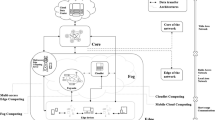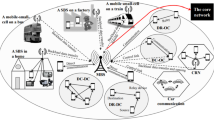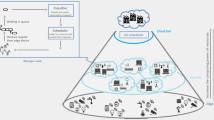Abstract
With the rapid development for the technology of Mobile edge computing (MEC), tasks tend to be more diversified and personalized, but fewer scholars considered differentiated quality of service requirements from diverse tasks in task offloading studies. In order to guarantee the real-time performance of latency-sensitive tasks and the throughput of latency-tolerant tasks, we propose a task offloading strategy in a MEC system with a two-tier edge structure. We establish a system model composed of a local model and an edge model to capture the workflow of tasks based on our proposed task offloading strategy, and we derive the key performance measures in terms of the average delay of a latency-sensitive task, the average delay of a latency-tolerant task, the utility of MBS Cluster I and the average power of the MEC system. We carry out experiments with analysis and simulation out to evaluate the long-term performance and validate the effectiveness of our proposed task offloading strategy. Finally, by trading off the average delay of a task and the average power of the MEC system, we formulate an optimization problem with inequality constraints for the average delay of a latency-sensitive task and the stability conditions of the MEC system. Furthermore, we develop an improved Powell–Hestenes–Rockafellar algorithm based on Lagrangian multiplier method to jointly optimize the offloading probabilities of the two types of tasks.







Similar content being viewed by others
Code availability
The code generated during the current study is available from the corresponding author on reasonable request.
Availability of data and materials
The datasets generated and analyzed during the current study are available from the corresponding author on reasonable request.
References
Liu L, Pei Q, Maharjan S, Zhang Y (2021) Vehicular edge computing and networking: a survey. Mob Netw Appl 26(3):1145–1168. https://doi.org/10.1007/s11036-020-01624-1
Muniswamaiah M, Agerwala T, Tappert CC (2021) A survey on cloudlets, mobile edge, and fog computing. In: 8th IEEE International Conference on Cyber Security and Cloud Computing (CSCloud)/ 7th IEEE International Conference on Edge Computing and Scalable Cloud (EdgeCom), pp 139–142 . https://doi.org/10.1109/CSCloud-EdgeCom52276.2021.00034
Ranaweera P, Jurcut AD, Liyanage M (2019) Realizing multi-access edge computing feasibility: security perspective. In: IEEE Conference on Standards for Communications and Networking (CSCN), pp 1–7. https://doi.org/10.1109/CSCN.2019.8931357
Alraddady S, Soh B, AlZain MA, Li AS (2022) Fog computing: strategies for optimal performance and cost effectiveness. Electronics 11(21):3598. https://doi.org/10.1016/j.sysarc.2020.101778
Liyanage M, Porambage P, Ding AY, Kalla A (2021) Driving forces for multi-access edge computing (MEC) IoT integration in 5G. ICT Express 7(2):127–137. https://doi.org/10.1016/j.icte.2021.05.007
Deng X, Li J, Liu E, Zhang H (2020) Task allocation algorithm and optimization model on edge collaboration. J Syst Archit 110(9):101778. https://doi.org/10.1016/j.sysarc.2020.101778
Chen C, Guo R, Zhang W, Yang J, Yeo CK (2022) Optimal sequential relay-remote selection and computation offloading in mobile edge computing. J Supercomput 78(1):1093–1116. https://doi.org/10.1007/s11227-021-03919-w
Bai X, Jin S (2022) Performance analysis of an energy-saving strategy in cloud data centers based on a MMAP[K]/M[K]/N1+N2 non-preemptive priority queue. Future Gener Comput Syst 136:205–220. https://doi.org/10.1016/j.future.2022.06.004
Li Z, Chang V, Hu H, Yu D, Ge J, Huang B (2021) Profit maximization for security-aware task offloading in edge-cloud environment. J Parallel Distrib Comput 157:43–55. https://doi.org/10.1016/j.jpdc.2021.05.016
Dai Y, Xu D, Maharjan S, Zhang Y (2018) Joint computation offloading and user association in multi-task mobile edge computing. IEEE Trans Veh Technol 67(12):12313–12325. https://doi.org/10.1109/TVT.2018.2876804
Li W, Jin S (2021) Performance evaluation and optimization of a task offloading strategy on the mobile edge computing with edge heterogeneity. J Supercomput 77(11):12486–12507. https://doi.org/10.1007/s11227-021-03781-w
Shahryari O-K, Pedram H, Khajehvand V, TakhtFooladi MD (2021) Energy and task completion time trade-off for task offloading in fog-enabled IoT networks. Pervasive Mob Comput 74(5):101395. https://doi.org/10.1016/j.pmcj.2021.101395
Almutairi J, Aldossary M (2021) A novel approach for IoT tasks offloading in edge-cloud environments. J Cloud Comput 10(1):10–28. https://doi.org/10.1186/s13677-021-00243-9
Bi S, Zhang Y (2018) Computation rate maximization for wireless powered mobile-edge computing with binary computation offloading. IEEE Trans Wirel Commun 17(6):4177–4190. https://doi.org/10.1109/TWC.2018.2821664
Huang P, Wang Y, Wang K, Liu Z (2020) A bilevel optimization approach for joint offloading decision and resource allocation in cooperative mobile edge computing. IEEE Trans Cybern 50(10):4228–4241. https://doi.org/10.1109/TCYB.2019.2916728
Singh P, Singh R (2022) Energy-efficient delay-aware task offloading in fog-cloud computing system for IoT sensor applications. J Netw Syst Manag 30(1):1–25. https://doi.org/10.1007/s10922-021-09622-8
Wan S, Li X, Xue Y, Lin W, Xu X (2020) Efficient computation offloading for internet of vehicles in edge computing-assisted 5G networks. J Supercomput 76(4):2518–2547. https://doi.org/10.1007/s11227-019-03011-4
Zhang G, Zhang S, Zhang W, Shen Z, Wang L (2021) Joint service caching, computation offloading and resource allocation in mobile edge computing systems. IEEE Trans Wirel Commun 20(8):5288–5300. https://doi.org/10.1109/TWC.2021.3066650
Yuan H, Zhou M (2021) Profit-maximized collaborative computation offloading and resource allocation in distributed cloud and edge computing systems. IEEE Trans Autom Sci Eng 18(3):1277–1287. https://doi.org/10.1109/TASE.2020.3000946
Liu L, Chang Z, Guo X, Mao S, Ristaniemi T (2018) Multiobjective optimization for computation offloading in fog computing. IEEE Internet Things J 5(1):283–294. https://doi.org/10.1109/JIOT.2017.2780236
Zheng H, Jin S (2022) A multi-source fluid queue based stochastic model of the probabilistic offloading strategy in a MEC system with multiple mobile devices and a single mec server. Int J Appl Math Comput Sci 32(1):125–138. https://doi.org/10.34768/amcs-2022-0010
Liu J, Zhang X (2022) Truthful resource trading for dependent task offloading in heterogeneous edge computing. Future Gener Comput Syst 133:228–239. https://doi.org/10.1016/j.future.2022.03.010
Liu J, Ren J, Zhang Y, Peng X, Zhang Y, Yang Y (2001) Efficient dependent task offloading for multiple applications in MEC-Cloud system. IEEE Trans Mob Comput. https://doi.org/10.1109/TMC.2021.3119200
Guo K, Zhang R (2022) Fairness-oriented computation offloading for cloud-assisted edge computing. Future Gener Comput Syst 128:132–141. https://doi.org/10.1016/j.future.2021.10.004
Yi C, Cai J, Zhu K, Wang R (2022) A queueing game based management framework for fog computing with strategic computing speed control. IEEE Trans Mob Comput 21(5):1537–1551. https://doi.org/10.1109/TMC.2020.3026194
Ma X, Wang S, Zhang S, Yang P, Lin C, Shen X (2019) Cost-efficient resource provisioning for dynamic requests in cloud assisted mobile edge computing. IEEE Trans Cloud Comput 9(3):968–980. https://doi.org/10.1109/TCC.2019.2903240
Ross S (2014) Introduction to probability models. Academic press, America . https://doi.org/10.1016/C2012-0-03564-8
Zhai B, Blaauw D, Sylvester D, Flautner K (2004) Theoretical and practical limits of dynamic voltage scaling. In: 41st Design Automation Conference, pp 868–873. https://doi.org/10.1145/996566.996798
Wang Z, Zhang F (2020) A pricing mechanism which implements allocation in shannon formula of home cellular wireless communication. J Phys Conf Ser 1624(6):062002. https://doi.org/10.1088/1742-6596/1624/6/062002
Jin S, Yue W (2021) Resource management and performance analysis of wireless communication networks. Springer, Singapore. https://doi.org/10.1007/978-981-15-7756-7
Honnappa H, Jain R, Ward AR (2015) A queueing model with independent arrivals, and its fluid and diffusion limits. Queueing Syst 80(1):71–103. https://doi.org/10.1007/s11134-014-9428-4
Kwak J, Choi O, Chong S, Mohapatra P (2014) Dynamic speed scaling for energy minimization in delay-tolerant smartphone applications. In: IEEE Conference on Computer Communications, pp 2292–2300 . https://doi.org/10.1109/INFOCOM.2014.6848173
Zhou W, Fang W, Li Y, Yuan B, Li Y, Wang T (2019) Markov approximation for task offloading and computation scaling in mobile edge computing. Mob Inf Syst 2019:8172698. https://doi.org/10.1155/2019/8172698
SPEC: SPECpower_ssj2008 (2022) http://www.spec.org/power_ssj2008/results/power_ssj2008.html
Zhao Z, Shi J, Li Z, Si J, Xiao P, Tafazolli R (2022) Multiobjective resource allocation for mmwave mec offloading under competition of communication and computing tasks. IEEE Internet Things J 9(11):8707–8719. https://doi.org/10.1109/JIOT.2021.3116718
Powell MJ (1969) A method for nonlinear constraints in minimization problems. In: Flethcher R (ed) Optimization, symposium of the institute of mathematics and its applications. Academic Press, New York
Hestenes MR (1969) Multiplier and gradient methods. J Optim Theory Appl 4(5):303–320. https://doi.org/10.1007/BF00927673
Rockafellar RT (1973) A dual approach to solving nonlinear programming problems by unconstrained optimization. Math Program 5(1):354–373. https://doi.org/10.1007/BF01580138
Funding
This work was supported by National Natural Science Foundation (Grant Numbers 62273292, 62276226 and 61973261), China; by the Innovation Capability Improvement Plan Project of Hebei Province (Grant Number 22567626H), China.
Author information
Authors and Affiliations
Contributions
All authors contributed to the conception and design of the task offloading strategy. HZ established the system model and performed the experiments. JG contributed significantly to the study of related works. SJ contributed to the writing, editing, supervision and funding acquisition.
Corresponding author
Ethics declarations
Conflict of interest
The authors have no competing interests to declare that are relevant to the content of this article.
Consent to participate
Not applicable.
Consent for publication
All authors reviewed the manuscript.
Ethical approval
Not applicable.
Additional information
Publisher's Note
Springer Nature remains neutral with regard to jurisdictional claims in published maps and institutional affiliations.
Rights and permissions
Springer Nature or its licensor (e.g. a society or other partner) holds exclusive rights to this article under a publishing agreement with the author(s) or other rightsholder(s); author self-archiving of the accepted manuscript version of this article is solely governed by the terms of such publishing agreement and applicable law.
About this article
Cite this article
Zhao, H., Geng, J. & Jin, S. Performance research on a task offloading strategy in a two-tier edge structure-based MEC system. J Supercomput 79, 10139–10177 (2023). https://doi.org/10.1007/s11227-023-05059-9
Accepted:
Published:
Issue Date:
DOI: https://doi.org/10.1007/s11227-023-05059-9




